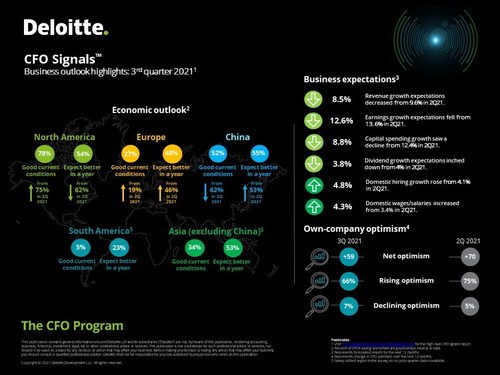Key takeaways
- Seventy-eight percent of CFOs rated the current North American economy as good, up from 75% in the second quarter of 2021; however, only 54% expect conditions to be better a year out, a decline from 62% in the prior quarter.
- Compared to three months ago, 66% of CFOs are more optimistic about their companies’ financial prospects.
- Talent/labor concerns significantly dominated internal risks, while COVID-19 and its variants are the chief external risk concern.
- More than 40% of CFOs indicate supply chain shortages or delays have increased their companies’ costs by 5% or more, and 60% said this year’s sales have either been reduced or will be by the end of the year as a result of supply chain disruptions.
- Forty-six percent of CFOs noted they expect as much as 10% of their organizations’ growth in the next three years to come from M&A, while 40% said M&A will fuel 11% to 30% of their companies’ growth.
Read More: Epson Partners With Runway To Drive Digital Transformation & Build An Innovation Ecosystem
Why it matters to CFOs?
Each quarter, CFO Signals™ tracks the thinking and actions of leading CFOs representing North America’s largest and most influential companies. Since 2010, the survey has provided key insights into the business environment, company priorities and expectations, finance priorities, and CFOs’ personal priorities. Participating CFOs represent diversified, large companies, with the vast majority reporting revenue in excess of $1 billion. More than one-quarter are from companies with greater than $10 billion in revenue.
Economic outlook
When assessing the current status of the five regional economies, 78% of CFOs ranked North America as good or very good, up from 75% in the second quarter of 2021. More than half of CFOs (52%) said the same for China, a decline from 62% in the previous quarter. CFOs raised their sentiment toward Europe’s economy, with 27% citing it as good or very good, an increase from 19% in the second quarter of 2021. For the first time in the survey’s history, CFOs were asked to assess the economy of Asia, excluding China, and about one-third of CFOs (34%) consider it to be good or very good. CFOs were also asked to assess South America’s economy, again for the first time, with 5% viewing it as good or very good.
A look at CFOs’ assessments of future economic conditions showed 54% expect North America’s economy to be better a year out, a decline from 62% in the prior quarter, while 55% believe China’s economy will improve, up slightly from the 53% who said the same in the second quarter of 2021. CFOs’ expectations that Europe’s future economy will improve 12 months out also inched up slightly, to 48% from 46% in the second quarter of 2021.
Risk concerns and risk-taking
Once again, talent from various perspectives—retention, morale, burnout, return-to-work challenges, disgruntlement, and others—ranked highest among CFOs’ internal risk worries. CFOs also cited rising costs and wage inflation, among other concerns. When it came to external concerns, CFOs cited COVID-19, along with its variants, its resurgence, and its impact on return-to-work on-site and normal operations most frequently. Inflation, changes in regulations, supply chain challenges, and cybersecurity were also high on their list of external worries. Sixty-five percent of CFOs indicated that now is a good time to be taking greater risks, flat compared to last quarter’s 65%.
Own-company sentiment
While CFOs expressed greater optimism for their companies’ financial prospects—more so than many other quarters pre-pandemic—their net optimism declined from the second quarter of 2021. This quarter’s net optimism was 59%, as just 7% of CFOs indicated declining optimism versus the 66% of CFOs who expressed rising optimism. Net optimism among US CFOs decreased to 55% this quarter from the second quarter of 2021’s 74%. Among CFOs of Canadian companies, net optimism increased to 71% from 50% last quarter, while the net optimism of CFOs from Mexican companies increased to 100% from 40% in the second quarter of 2021. CFOs in several industries indicated high levels of net optimism, particularly Technology (86%), Retail/Wholesale (78%), and Healthcare/Pharma (70%). CFOs from Energy/Resources and Telecom/Media/Entertainment were the least optimistic at 25% and 0%, respectively.
Read More: SalesTechStar Interview With Shannon Jessup, Chief Revenue Officer At TvScientific
Key operating metrics
CFOs lowered their year-over-year growth expectations for four of six key metrics, despite indicating greater optimism for their own companies’ performance. Revenue growth decreased to 8.5% from 9.6% in the second quarter of 2021. Expectations for earnings growth fell to 12.6% from 13.6% in the second quarter of 2021, while capital spending growth declined to 8.8% from 12.4% in the second quarter of 2021. Dividend growth dipped slightly to 3.8% from 4.0% in the second quarter of 2021. CFOs raised their growth expectations for both domestic hiring and domestic wages/salaries, with domestic hiring increasing to 4.8% from 4.1% in the second quarter of 2021, and domestic wages/salaries rising to 4.3% from 3.4% in the second quarter of 2021.
Mergers and acquisitions (M&A) plans
M&A is on the CFO agenda, especially in light of the difficulty of growing organically. Slightly more than one-quarter said M&A will fuel 11% to 20% of their companies’ growth, and another 14% of CFOs expect deals to create 21% to 30% of their growth in the next three years. Many are looking outside their core/traditional industry for opportunities, and favorable price and fit is their top focus when weighing options. CFOs are also using M&A to maintain their competitive positioning and taking advantage of disruptive opportunities to secure future positioning. Still, even in ideal circumstances, delivering an M&A deal is challenging, and CFOs indicated valuation of assets and difficulty of financing, integration/divestiture execution, and translating the businesses’ strategic needs into an effective M&A strategy as their top three hurdles.
Supply chains
Regarding supply chains, 44% of CFOs said shortages or delays have increased their companies’ costs by 5% or more. Thirty-two percent of CFOs reported their 2021 sales have fallen already, while 28% expect future sales to suffer this year as a result. They cited cyber risk, operational risk, and geopolitical risk as the top three risks related to their supply chains. In addition, CFOs were asked how their supply chains might change within three years. Their responses ranged from diversification of sources (69% of CFOs expect to increase it) to greater vertical integration (cited by 23% of CFOs) to increasing or decreasing sourcing from various regions, with North America expected to see more increases than other regions.
Key quotes
“While CFOs remain relatively positive, they continue to face both internal and external risks. From an internal perspective, talent along with return-to-work issues are causing significant anxiety. Strategy execution and cybersecurity are also top of mind,” said Steve Gallucci, national managing partner, U.S. Chief Financial Officer Program, Deloitte LLP. “Externally, COVID-19 was overwhelmingly the most frequent response, followed by inflation, regulation, and supply chain.”
“In light of global supply chain disruptions over the last 18 months, 44% percent of CFOs surveyed stated that shortages or delays have increased their companies’ costs by 5% or more. Furthermore, cyber, operational, and geopolitical risks are CFOs’ top three concerns when managing their supply chains.” –Sharon Chand, Risk & Financial Advisory Cyber Risk Secure Supply Chain Leader principal, Deloitte & Touche LLP
“As the potential to grow organically becomes more challenging for organizations, it’s not surprising that CFOs surveyed this quarter intend to utilize M&A as a strategy for growth, including looking outside of their core industries for opportunities. Slightly more than 25% of CFOs stated M&A will fuel 11% to 20% of their companies’ growth, and another 14% of CFOs expect deals to create 21% to 30% of their growth in the next three years.”-Trevear Thomas, National Managing Principal, Mergers, Acquisitions, and Restructuring Services, Deloitte Consulting LLP
Methodology
Each quarter, CFO Signals tracks the thinking and actions of CFOs representing many of North America’s largest and most influential organizations. This report summarizes CFOs’ opinions in four areas: business environment, company priorities and expectations, finance priorities, and CFOs’ personal priorities.
The CFO Signals survey for the third quarter of 2021 was conducted between August 2, 2021, and August 14, 2021. A total of 96 CFOs responded. This survey seeks responses from CFOs across the United States, Canada, and Mexico, and the vast majority are from companies with more than $1 billion in annual revenue. Participation is open to all industries except public sector entities.






















